On June 19, 2024, during a visit to Pyongyang, Russian President Vladimir Putin signed a mutual defense pledge with North Korea’s leader, Kim Jong Un. In the Q&A below, Hanna Foreman engages with Brookings scholars Angela Stent and Andrew Yeo to get their different perspectives on the Kim-Putin summit.
First impressions of the summit
HANNA FOREMAN:
What are your initial impressions of the summit between North Korean leader Kim Jong Un and Russian President Vladimir Putin?
ANGELA STENT:
This was a successful summit from Putin’s point of view. His last visit to Pyongyang was in 2000 and, since then, North Korea has emerged as a key asset in his war against Ukraine. He wanted to ensure the continued supply of artillery and ballistic missiles from North Korea for use on the battlefield. He received a lavish welcome in Pyongyang and signed a comprehensive strategic partnership agreement with Kim similar to that signed between the Democratic People’s Republic of Korea (DPRK) and the USSR in 1961. This commits both parties to come to each other’s assistance if one of them is attacked. But it is not clear exactly what this means, and it is unlikely that either of them will be attacked by another country. Putin also asserted that North Korean troops would not be involved in his “special military operation” in Ukraine. Since Russia invaded Ukraine and the West imposed sanctions, Putin has declared war on the West and has increasingly turned to non-Western and anti-Western countries—such as Iran and North Korea—to support his war effort. He has reversed three centuries of Russia looking to Europe as a partner.
The public documents and statements do not reveal what North Korea will receive in return. It is assumed that Russia is providing technology for the DPRK’s satellite program. Russia may well assist Kim in further developing his nuclear weapons program, which is of great concern to China, South Korea, the United States, and other Asian and European countries.
ANDREW YEO:
The Putin-Kim summit erases any doubt that the two leaders want to preserve their relationship beyond the duration of the Ukraine war. Leaders do not sign treaties formalizing military and diplomatic commitments as Putin and Kim did unless they intend to build a long-lasting relationship. In particular, the new comprehensive strategic partnership between Russia and North Korea resurrects a Cold War-era mutual defense pledge: if either party is “put in a state of war by an armed invasion” then the other side “shall provide military and other assistance with all means in its possession without delay.” Both leaders will reap immediate military and political gains from their meeting. Moscow will continue to receive North Korean missiles and ammunition which, despite their reported poor quality, will help Russia sustain its war against Ukraine. Russia, in return, seems prepared to offer North Korea increased military-technical cooperation. Other support in the form of food, energy, and economic assistance will enable Kim to shore up his own regime’s survival.
Impact on the upcoming NATO summit
HANNA FOREMAN:
Looking ahead to the upcoming NATO Summit in Washington on July 9-11, how do Putin’s recent trips to China, North Korea, and Vietnam shape the summit’s agenda?
ANGELA STENT:
Putin’s Asia trips have reinforced the reality that, since Russia’s 2022 invasion of Ukraine, European and Asian security cannot be decoupled. Putin would not have invaded had he not understood that China would support Russia, even if he failed to apprise Xi Jinping of his exact plans during his visit to Beijing weeks before the war began. China, while officially neutral, has repeated Russia’s narrative blaming NATO for the outbreak of the war. Beijing supplies Russia with the wherewithal to bolster Russia’s military-industrial base and prosecute the war—machine tools, microelectronics, and other technology—that Moscow in turn is using to produce missiles, tanks, and aircraft.
Although China has not sanctioned Russia, it has been careful up till now not to take actions which would subject Beijing to secondary sanctions. While Putin was in China in May, he traveled to Harbin and visited one of China’s most prestigious universities, the Harbin Institute of Technology, which is closely linked to China’s military and several Russian institutions and known for its defense research. Although the extent of Russian-Chinese defense cooperation is not publicly known, China is enabling Russia to continue to attack Ukraine and thus represents a threat to European security.
North Korea, in addition to supplying artillery and missiles to Russia, could be used to target Ukraine’s supporters militarily. In response to the United States and European countries permitting Ukraine to use their weapons to strike targets inside Russia, Putin has said that Russia could supply weapons to countries in proximity to Ukraine’s supporters, presumably including South Korea. Seoul is now deciding whether to supply lethal weapons to Ukraine. Japan, South Korea, Australia, and New Zealand will attend the NATO summit for the third consecutive year, highlighting the significance of Asian security for European security. While the summit’s focus will be Ukraine and the importance of denying Russia a victory, there will be acknowledgment of the threat that Russia and its Asian partners and allies together present to Europe and discussion of how to respond to this new reality.
Opportunities and challenges for the Indo-Pacific Four
HANNA FOREMAN:
What opportunities and challenges does this new partnership present for NATO’s collaboration with the Indo-Pacific Four (IP4), South Korea, Japan, Australia, and New Zealand?
ANDREW YEO:
The Putin-Kim summit underscores the cross-regional linkages that have developed in the post-COVID-19 era of geopolitics. By meeting just a few weeks before the NATO summit in Washington, the two leaders are sending a clear message that Western sanctions and diplomatic isolation have failed. Putin’s trips to Beijing, Pyongyang, and Hanoi this spring indicate that non-U.S. allies in Asia still want to do business with Moscow despite Russia’s blatant assault against Ukrainian sovereignty. The decision of U.S. partners in Asia such as India, Thailand, and Vietnam to import Russian energy sources also undercuts the Biden administration’s broader framing of values-based diplomacy and offers political cover for developing nations to ignore U.S. efforts to isolate Moscow. This obviously poses a challenge for NATO and its IP4 partners in the battle of narratives to discredit Russian claims and win support for Ukraine.
At the same time, the Putin-Kim summit also creates an opportunity for NATO to work more closely with the IP4 by sharing information and intelligence related to North Korea-Russia ties and other cross-regional linkages. South Korea and Japan, in particular, might offer important perspectives on North Korean ballistic missiles and the types of weapons North Korea might be supplying to Russia.
Additionally, the Putin-Kim summit has reportedly led Seoul to rethink its policy of not directly arming Ukraine. Putin last month praised South Korea for not directly providing lethal military assistance to Ukraine, signaling his openness to maintaining ties with South Korea. President Yoon Suk Yeol has also demonstrated a modicum of restraint in his words about building smooth relations with Russia. However, Russia’s willingness to enhance North Korean capabilities at the expense of South Korean security may have crossed a line for Seoul. Although existing policies prevent Seoul from selling arms to countries engaged in active conflict, direct military support in the form of lethal weapons to Ukraine would be welcomed by most NATO members.
North Korea-Russia axis big picture
HANNA FOREMAN:
How does the growing cooperation between North Korea and Russia impact global politics and the effectiveness of international institutions?
ANGELA STENT:
Putin’s trip to North Korea was intended to showcase what he sees as the new axis of resistance—Russia, China, North Korea, and Iran. He has broken with the West and champions his new Eurasian vision, designed to appeal to the Global South and, more specifically, to the members of the expanding BRICS bloc. Although Russia usually presents itself as a champion of the United Nations, it defied the U.N. by unilaterally ending the U.N. body charged with overseeing the implementation of the sanctions against North Korea. When he was in Pyongyang, Putin promised to help North Korea end the sanctions regime, although it was not clear how he proposed to do that. Russia has, moreover, vetoed every attempt by the Security Council to hold the Kremlin responsible for attacking and waging war on Ukraine. The war has highlighted the U.N.’s impotence.
The Russia-Ukraine war has ended the post-Cold War global order and it is unclear what will emerge once the war is over. Both Russia and China favor a “post-West,” multipolar order that will end U.S. domination of the international system and will make the world safe for authoritarianism. Large parts of the Global South support the call for a new, multipolar order. Whether and how it emerges will depend on how the war concludes and what role Putin’s new allies, like North Korea, will play in the emerging system.
ANDREW YEO:
Russia’s and China’s permanent memberships to the U.N. Security Council ensure that norm-violating nuclear states like North Korea will remain politically protected on the global stage. Although the United States and its allies are looking to other institutions to address global concerns, the resurgence of the G7 and the strengthening or development of existing and new regional institutions such as the Quad, AUKUS, and the U.S.-Japan-South Korea trilateral is in part a consequence of failed (or failing) global governance. The return of “bloc politics” only exacerbates divisions on the global stage, making it harder to build consensus on issues, such as non-proliferation. As much as some scholars are loath to describe current geopolitical trends as a new cold war, Russia and North Korea are trying to do just that—recreate the dynamics of the Cold War in an effort to weaken Western influence on the global stage.
The Brookings Institution is committed to quality, independence, and impact.
We are supported by a diverse array of funders. In line with our values and policies, each Brookings publication represents the sole views of its author(s).

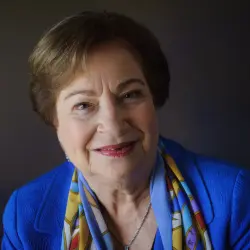
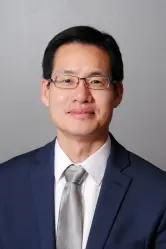

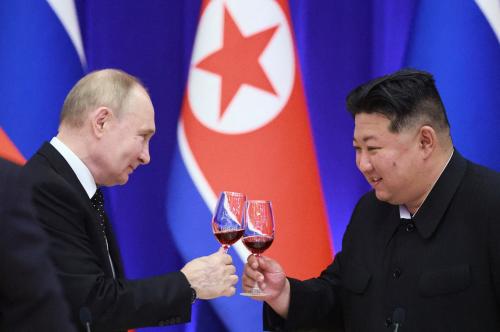
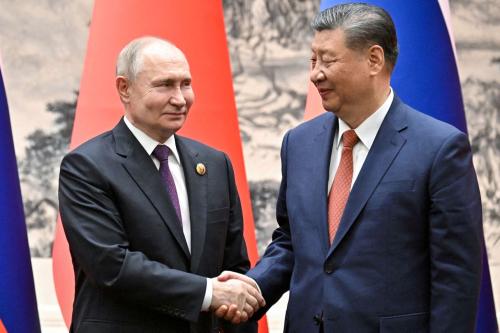
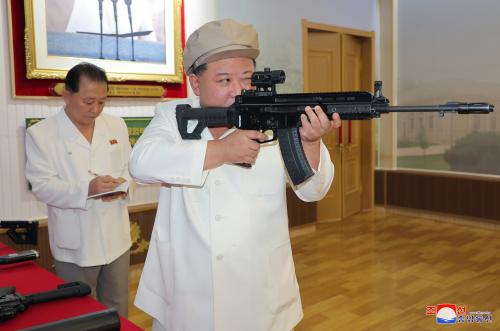

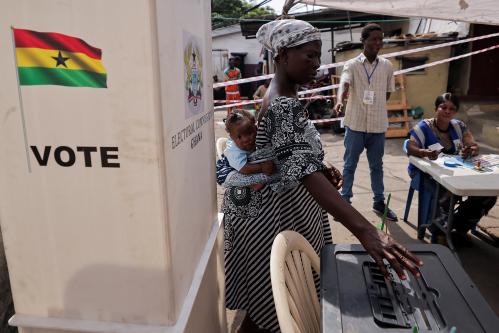
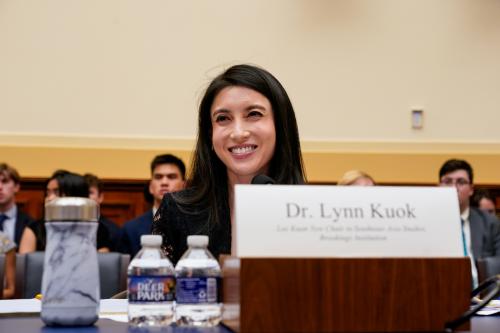
Commentary
What happens after the Kim-Putin summit?
July 3, 2024